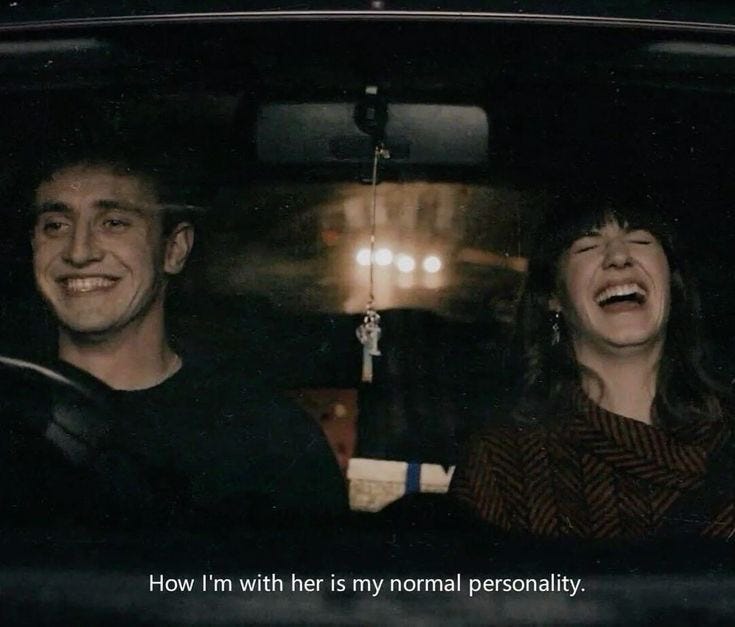I Finally Read Sally Rooney’s Normal People
On codependency and mismatched relationships; a bite sized review and my initial thoughts
Warning: spoilers for Normal People by Sally Rooney and dicussions of sensitive topics such as abuse and bullying.
“It’s funny the decisions you make because you like someone, he says, and then your whole life is different. I think we’re at that weird age where life can change a lot from small decisions.” — Sally Rooney, Normal People.
I recently finished my first ever Sally Rooney novel: Normal People. In Normal People, Connell and Marianne are from a small town in Ireland. Connell’s popular and poor, Marianne’s uncool and rich. Against all odds, the two find each other and their relationship spans several years—from high school, college and beyond.
I have mixed feelings about Normal People. There’s nothing normal about them; Connell is heavily anxious, and his anxiety causes him to become obsessed with how people view him down to the minute detail. He hides his relationship with Marianne out of fear of people judging him and wracks himself with guilt about it even though nobody really cared. Marianne on the other hand, has a difficult home life as her family is abusive. Her struggles are further exacerbated by the bullying and ostracisation she faces at school. Both experiences contribute to her identity and self-worth issues, especially in her romantic endeavours. As a result, Connell is horrible at communication and opening up to anyone, and Marianne has difficulty valuing herself. Together, they’re a horribly mismatched, unstable and toxic couple.
However, I couldn’t help but read. There’s something so captivating about their relationship, that I actually finished the book in two days. Normal People is a fine line between romanticisation and realism. Connell and Marianne are the only two people in each others’ lives that will ever understand the other—not in the waxy, poetic way, but it’s a genuine connection. Connell can’t readily share himself with most people and instead tells Marianne things that no one else knows, because he trusts Marianne won’t tell anyone. Connell plays the knight in shining armour for Marianne, and she believes that ‘he’s all the good in her life’ because Connell offers her the love, safety and protection she never got from her family and others.
By far, the most interesting facet of the novel for me is their dependency on each other, and Marianne’s supposed coldness. Marianne regards Connell so highly, even though he himself demeans her on several occasions. Marianne’s an incredibly independent person however, who’s capable of standing up for herself, as seen through two confrontations she has in the book. Therefore, does Marianne demean herself for Connell? Even if she does, Connell lets her, knowing she’d bend over backwards for him. It’s something the both of them think about a lot. Connell is hyper aware of the fact that Marianne would do anything he asked, even though he doesn’t explicitly take advantage of this. Marianne knows this as well, as we see through her inner dialogue how highly she regards Connell and states to herself multiple times that she would do anything for him.
In regards to this, the ending is the most disappointed I have been reading a novel—but not in a negative sense. Yes, I was expecting something more solid, but it goes to show that despite how many years have gone by, Connell and Marianne are still the same people. Connell accepts an offer to pursue his MFA in New York and in my opinion, pretends to be on the fence about his decision. Marianne proclaims that she’ll be home, waiting for him should he come back after graduating. Connell extends his world, while Marianne’s revolves around him.
They’re different people—more mature, more intelligent, more wise, but they can’t help reverting back into those archetypal high school roles they once adopted when they’re together. It happens at the start of the book when Connell chooses to take another girl, Rachel, to the debutante, again in the middle when Connell moves back home after losing his job, and at the end, with his MFA. Throughout all three situations, Marianne is left behind while Connell is allowed to constantly reinvent himself. It’s not clearly Connell’s fault because a lot of factors are at play, but ultimately, the result is still the same. It’s a frustrating cycle when it comes to reading, but as a story, the cyclical nature of their relationship is exceptionally well written. Connell and Marianne will always be stuck in the spiral of their relationship, if they can help it.






tried watching it but it never happened. maybe it's because i had already watched most of conversations with friends, which i enjoyed in a detached way. great analysis + review!
i've been wanting to read it for the longest time but never did! hopefully i'll be able to read it this year 🙏 also i've been loving your posts! :)